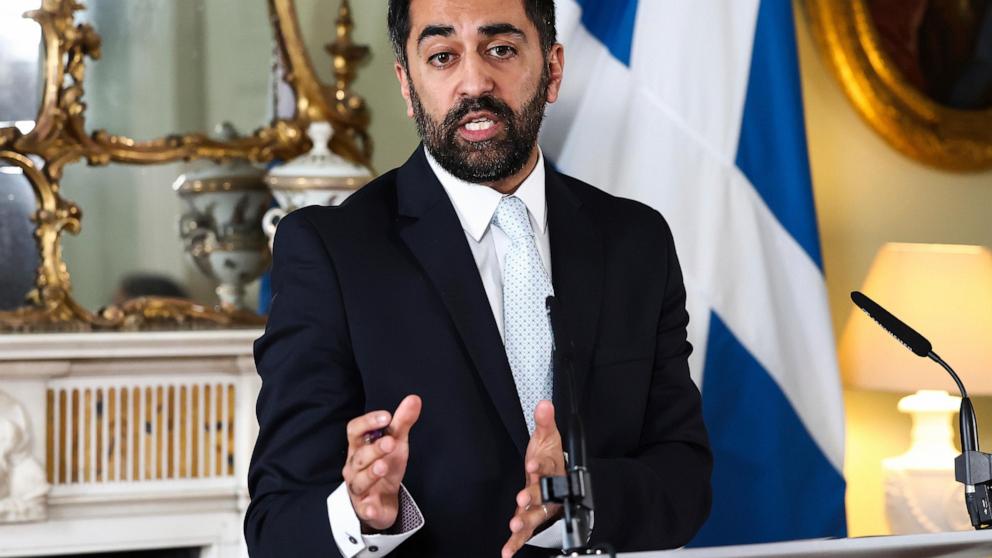LONDON – Scotland's first minister, Humza Yousaf, resigned on Monday, sparking a leadership race as the ruling Scottish National Party seeks to mend internal divisions and strengthen its position ahead of a national parliamentary election scheduled for later this year. It broke out.
Yousaf's pro-independence party has been weakened by campaign finance scandals and divisions over transgender rights, and he was ousted by a decision to expel the Green Party from the coalition government over disagreements over climate change targets. . He was unable to persuade other parties to support his minority government in Scottish local councils.
With no prospects of victory in two confidence votes scheduled for later this week, Yousaf resigned rather than be forced out. He will remain prime minister while the SNP seeks to elect a successor who will be able to control a parliamentary majority.
“We have come to the conclusion that the only way to bridge the political divide and repair the relationship between our two countries is for someone to take charge,” Yousaf told reporters in the Scottish capital, Edinburgh.
The debacle has further heated up Britain's political situation, as the country prepares for parliamentary elections as concerns about immigration, health care and government spending undermine support for the ruling Conservative Party.
The Conservative Party and the opposition Labor Party had proposed separate no-confidence motions against Yousaf and his government as they sought to weaken the SNP ahead of the general election. The SNP has been the dominant party in Scottish politics for almost 20 years and currently holds 43 of Scotland's 59 seats in the UK Parliament. The biggest beneficiary of the SNP's problems is likely to be Labor, as both parties share left-leaning policies.
Local elections will be held in England and Wales on Thursday, which are seen as a barometer of support for Chancellor Rishi Sunak's government.
But the SNP's focus is on repairing the party's image in Scotland and choosing a leader who can attract support from at least one opposition party in local councils, which have 63 of 128 seats, one seat short of a majority.
That job appeared to be within reach on Monday, as the Greens said they were willing to work with the SNP now that Mr Youssaf was gone.
Green Party co-leader Patrick Harvey said: “The SNP remains by a wide margin the largest party in Parliament and has the right to form a minority government.” “The Scottish Greens have a long track record of working constructively with opposition and will do so with any first minister who shares our progressive values and who secures our confidence. .”
Former deputy prime minister John Swinney, one of Mr Yousaf's potential successors, said he was “thinking very carefully” about seeking the top job. Another potential candidate is Kate Forbes, who narrowly lost to Yousaf in the last leadership contest. She is considered unacceptable by the Green Party because of her conservative religious views and her opposition to gender identity reform.
Whoever the SNP chooses, the new leader will face the same tough electoral calculus that proved to be Mr Yousaf's undoing.
With all other parties against him, Yousaf would have had to make a deal with the breakaway Alba party, which holds just one seat, to secure his job.
Founded in 2021 by former SNP leader and first minister Alex Salmond, Alba sees itself as a true voice for Scottish independence. In return for his support, Mr Alba called on Mr Yousaf to put independence at the top of his agenda, move away from divisive “identity politics” and focus on issues such as jobs, education and investment in Scottish industry. did.
That was too much for Yousaf.
“While the route through this week's no-confidence motion is absolutely possible, I am not willing to trade my values and principles or do business with anyone just to stay in power,” he said. Stated.
Mr Yousaf became SNP leader and Scotland's first minister in March 2023, after former leader Nicola Sturgeon resigned, citing the sacrifices of more than eight years in office.
Support for the SNP comes as the party backs legislation to make it easier for people to change their gender, and hate crime legislation that would make transgender identity a protected characteristic, despite not giving all women the same protections. There was a partial decline due to the implementation of
Then came Mr Yousaf's decision to scrap Scotland's target to cut carbon emissions by 75% by 2030.
He said Scotland would reach its target of net-zero carbon emissions by 2045, but the decision caused tensions with coalition partners. The Green Party initially supported the changes, but party leaders said they would survey wider membership and change course if necessary.
Mr Yousaf abruptly ended a power-sharing agreement with the Green Party last week, embarrassing two Green Party ministers who arrived at a cabinet meeting. Yousaf acknowledged his mistake on Monday, but it was too late to repair his damage.
Murray Pittock, an expert on Scottish nationalism at the University of Glasgow, told The Associated Press: “Battered egos have destroyed countries before, and that's why they're causing the mess we're in now. That's not surprising.” “And nothing can hurt people's egos more than to remove ministers from their ministerial posts, and the entire party, without warning.”
___
For more of AP's Europe coverage, visit https://apnews.com/hub/europe.


